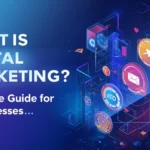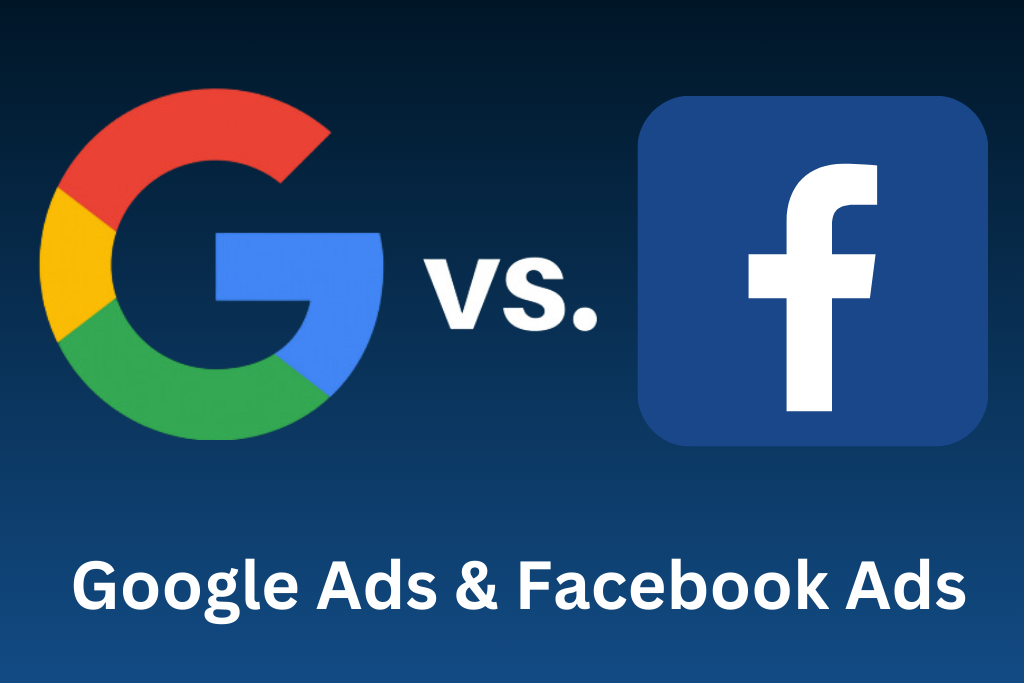Businesses are continuously looking for effective ways to reach their target audience and produce results in the ever-changing world of digital marketing. Google Ads and Facebook Ads are two of the most popular Internet advertising networks. While both have distinct advantages, selecting the best platform for your company can be a significant decision. In this blog post, we’ll look at the advantages and disadvantages of each platform to help you make an informed decision.
Google Ads: The Search Giant
Google Ads Overview
Google Ads, formerly known as Google AdWords, is Google’s advertising platform that allows businesses to display their ads on Google’s search engine and partner websites. It operates on a pay-per-click (PPC) model, meaning you only pay when someone clicks on your ad. Google Ads is divided into two primary networks: the Search Network and the Display Network.
Advantages of Google Ads
- High Intent Audience: Google users often have a clear intent when searching for products or services. When someone searches for “best running shoes,” they are likely in the market to buy running shoes. This high intent makes Google Ads highly effective for capturing potential customers.
- Keyword Targeting: Google Ads allows you to target specific keywords related to your business. You can bid on keywords relevant to your products or services, ensuring your ads appear when users search for those keywords.
- Results that can be measured: Google Ads offers sophisticated analytics and tracking tools. You can easily measure the performance of your campaigns, track conversions, and optimize your ad spend accordingly.
- Ad Extensions: You can enhance your ads with various extensions like site links, callouts, and location extensions, providing users with more information and increasing the chances of a click.
- Budget Control: Google Ads offers full control over your budget. Budgets can be created on a daily or monthly basis and modified as necessary. You may successfully manage your advertising costs thanks to this versatility.
Disadvantages of Google Ads
- Competition and Costs: High-intent keywords can be extremely competitive, leading to high bid prices. This can make it costly for businesses in competitive industries to maintain a strong presence.
- Google Ads can be challenging to learn, especially for new users. Setting up campaigns, choosing keywords, and optimizing ad copy may require a significant learning curve or professional assistance.
- Ad Blockers: Some users employ ad blockers, which can prevent your ads from reaching a portion of your target audience.
- Limited Demographic Targeting: While Google offers demographic targeting options, it’s not as precise as Facebook’s audience targeting capabilities.
Facebook Ads: The Social Networking Giant
Facebook Ads Overview
Facebook Ads is the advertising platform of the world’s largest social media platform, Facebook. It also includes Instagram and other partner networks. Facebook Ads offers a wide range of ad formats and targeting options to reach specific demographics and interests.
Advantages of Facebook Ads
- Precise Audience Targeting: Facebook Ads excels in audience targeting. You can create custom audiences based on demographics, interests, behaviors, and even website visits. This precision allows you to reach the right people with your message.
- Visual Appeal: Facebook and Instagram are highly visual platforms, making them ideal for showcasing products through images and videos. Creative, visually appealing ads often perform well on these platforms.
- Engagement and Interaction: Users on Facebook and Instagram are accustomed to engaging with content. You can encourage likes, comments, shares, and other interactions with your ads, fostering a sense of community and trust.
- Cost-Effective: Depending on your target audience and industry, Facebook Ads can be more cost-effective than Google Ads, especially for businesses with limited budgets.
- Advanced Analytics: Facebook provides detailed insights into ad performance, audience engagement, and conversions. This data helps you refine your ad strategy for better results.
Disadvantages of Facebook Ads
- Low-Intent Audience: Unlike Google, where users are actively searching for products or services, Facebook users may not have a direct intent to purchase. This can result in a longer conversion path.
- Ad Saturation: Some users might be overwhelmed by the number of ads they see on Facebook and Instagram, leading to ad blindness or ad fatigue.
- Algorithm Changes: Facebook frequently updates its algorithms, affecting how your ads are delivered and who sees them. It might be hard to keep up with these developments.
- Privacy Concerns: Facebook has faced criticism regarding data privacy, and this can affect user trust in ads on the platform.
Choosing the Right Platform for Your Business
Now that we’ve examined the strengths and weaknesses of both Google Ads and Facebook Ads, let’s discuss how to choose the right platform for your business.
Consider Your Business Goals
Your choice should align with your business objectives. If you aim to increase brand awareness and engagement, Facebook Ads may be the way to go. However, if your goal is to drive immediate sales and capture high-intent users, Google Ads is a better choice.
Know Your Target Audience
Understanding your target audience is crucial. If your audience is highly active on social media and you can define their interests and behaviors, Facebook Ads can help you reach them effectively. On the other hand, if your audience actively searches for products or services online, Google Ads can connect you with users at the right moment.
Budget Constraints
Consider your budget when deciding between the two platforms. Google Ads can be expensive, especially in competitive industries, while Facebook Ads often provide more cost-effective options.
Industry and Competition
Some industries naturally align with one platform over the other. For example, e-commerce businesses may benefit more from Google Ads, while lifestyle brands or content creators might find Facebook Ads more suitable.
Test and Optimize
It’s essential to remember that you’re not locked into one platform forever. Both Google Ads and Facebook Ads allow you to test your campaigns and optimize them over time. Experiment with both platforms, measure results, and allocate your budget based on performance.
Consider a Hybrid Approach
Many businesses find success by using both platforms simultaneously. This allows you to leverage the strengths of each while mitigating their weaknesses. For instance, you can use Google Ads to capture high-intent users actively searching for your products and Facebook Ads to retarget and engage with them.
Conclusion
In the Google Ads vs. Facebook Ads debate, there’s no one-size-fits-all answer. Your choice should align with your business goals, target audience, budget, and industry. Consider the unique advantages and disadvantages of each platform, and don’t be afraid to experiment to find the best mix for your business. Whether you choose Google Ads, Facebook Ads, or a combination of both, effective digital marketing can help you reach and engage your audience in today’s competitive online landscape.
 seolounge
seolounge




